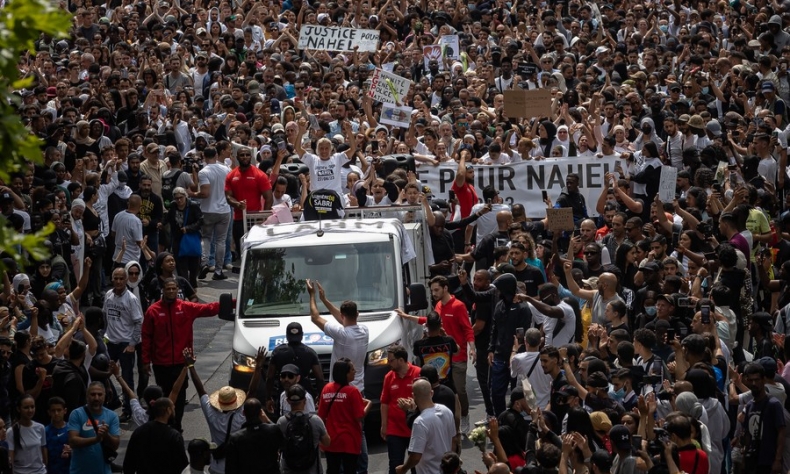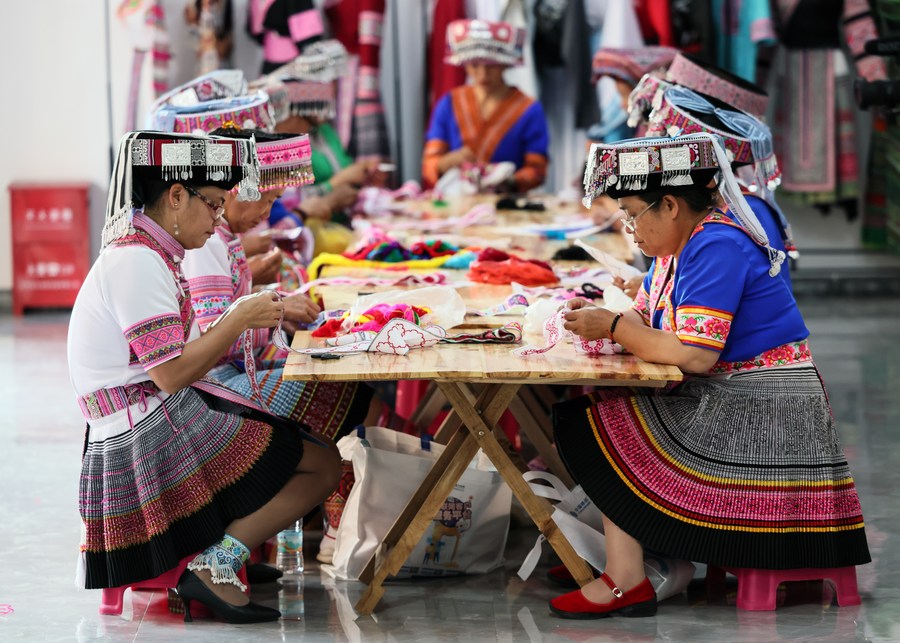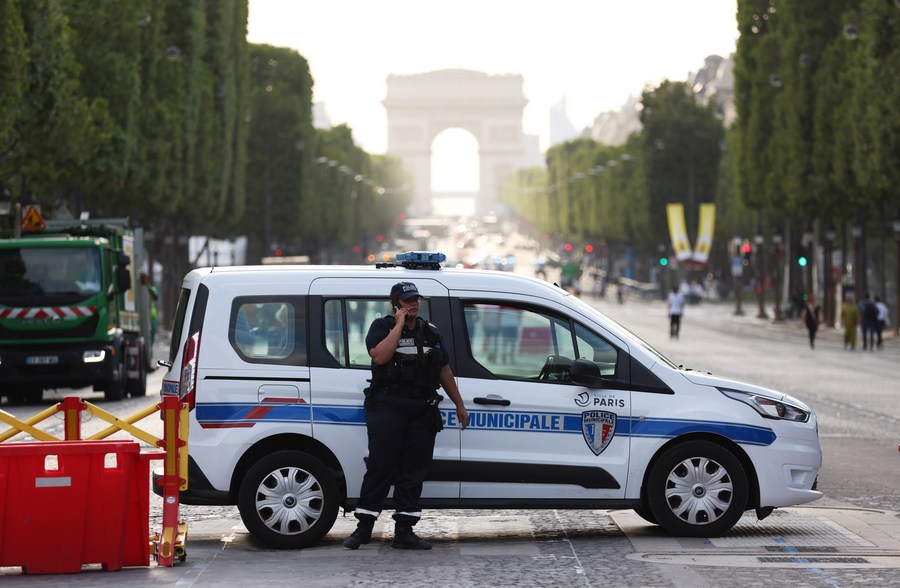What Are the Roots of the French Riots?

We should probably manage to look beyond, to the dramatic and profoundly disruptive effects of decades of a neoliberal agenda that have altered that scale of values that played a stabilizing role in terms of social justice.
The tragedy of a youth identified as Nahel M., a teenager of North African descent who was shot dead due to traffic violations after being stopped by traffic police in a Paris suburb on June 27, sparked a week of chaos in France.
According to official figures, at the time of writing on July 5, the riots had put almost 4,000 people in police custody, including 1,124 minors. This has become one of the most serious riots in France, topping the 2005 riots caused by the death of two teenagers of African descent who were accidentally electrocuted during a police chase, according to Xinhua News Agency. The United Nations asked France on June 30 to “seriously address the deep issues of racism and discrimination in its law enforcement.”
Many European socio-political experts are now saying there’s a “ticking time bomb” lurking under the pavements of the poorest areas of France and its neighboring countries. Amid these concerns, several European observers shared their thoughts with Beijing Review on what they considered the roots of the riots. Excerpts from their views follow:
Elsbeth van Paridon (the Netherlands), Sinologist and Editorial Consultant with Beijing Review
A Dutch Sinologist who was raised near Antwerp, Belgium, and has been living and working in China for more than 10 years, that’s me—in a nutshell.
Following the events of June 27, France was crippled by a week of escalating chaos, hatred and hostility, which even had a spillover effect into other European cities, including the Belgian capital of Brussels.
Close Flemish friends informed me how video footage of the riots was blowing up on TikTok, with many young commentators there voicing their support for the intensifying rampage, often adding that “the racist police officer responsible for Nahel’s death deserves to be shot in the chest at point blank as well.” Well kiddos, in the illustrious words of one Dr. Martin Luther King: “Darkness cannot drive out darkness, only light can do that. Hate cannot drive out hate, only love can do that.” Please remember that.

As I, too, watched the pitch-black plumes of smoke fizzle out in the Parisian summer air on my laptop and mobile screens, I wondered… Did Europe miss the boat—in pushing to reach underserved communities? Has social polarization across the continent spiraled out of control to the point of no return? In sum: Where did we go wrong?
Nanterre, where Nahel lived, is a banlieue with a large percentage of immigrants and a higher unemployment rate compared with the city of Paris or even another Paris suburb, Neuilly-sur-Seine, I read on the online portal of Le Soir, a French-language Belgian daily newspaper. Several studies conducted by European think tanks over the past 15 to 20 years have shown that problems relating to poverty, migration and social exclusion tend to be concentrated in Europe’s lower-income neighborhoods.
Throwing money at the problem appears to be nothing more than a Band-Aid solution. Simply handing out financial support to those in need can of course help pay the rent, put food on the table and even keep the lights on, but it doesn’t give young unemployed people any real incentive to go out and land a job, and with that the opportunity to make their way out of a dire situation and find new, healthier (in every sense) ground to grow from. Perhaps that’s where we (Europeans) went wrong.
So what did come to this author’s mind, were China’s general incentives to help its underprivileged people, those ethnic minorities included, break their way through the barriers that trap them in poverty by offering them training—business training, vocational training, artisanal training, you name it. Not just offering underprivileged people money, but offering them tools to create more fertile soil to grow a better life.
Take, for example, the Miao minority women in Yunnan Province who today are organized in collectives and serving up their age-old weaving and embroidery patterns and techniques to fashion brands within and outside China’s borders. Theirs is a story of emancipation, of empowerment, of pride. Many may disagree with me, and of course not every story is one of success, but the recent uproar in France, its banlieues and beyond shows Europe might want to take a leaf out of China’s playbook on this one. That way, there might be light at the end of the dark social tunnel the continent finds itself in right now. After all, tunnel vision, too, is never the answer.

Arnaud Bertrand (France), an entrepreneur and Twitter opinion leader who lived and worked in China for seven years and currently resides in Malaysia
I think all countries that have several cultures in their midst are at risk of something like what’s going on in France happening. And in China’s long history, similar events have happened countless times. That’s precisely the reason why China puts so much emphasis on harmony between its ethnic minorities, respecting differences and accommodating them.
I’d say the biggest difference between China and the West on this is that China has understood that cultures are pretty much permanent and that attempting to make a people change, or to adopt a different culture, is a futile exercise. And so, once that’s understood the question shifts from “how do we make these people adopt our values” to “what values should we have so that we all live in harmony with our different values in a way that’s acceptable to all.”
In my opinion, at heart, the issue is one of acknowledging different cultures exist and finding a way for these different cultures to peacefully coexist. The issue in France is that these youths are just lost between a French “native” culture they reject and their ancestral culture—which France rejects.
The real solution is to find a way for them to be proud of their culture in a way that France accepts and at the same time ensure we do so without compromising French “native” culture in a way that’s unacceptable. But some compromises will undoubtedly need to be made if we want to solve this. There are some very easy things France could do that’d go a long way, for instance, by recognizing Muslim holy days as bank holidays. Singapore does this for instance with 15 percent of its population being Muslim (roughly the same as France). There are very few downsides—people get more holidays—and it’s a sign of acceptance and respect.
Another example is teaching Arabic as a language in schools so that these youths can learn their ancestral language the right way, on top of French. Or allow Halal menus in French school canteens when you have Muslim students, which isn’t the case today. None of this has too much of a downside for the “native” French but again shows respect and acceptance for Muslims.

Professor Xulio Ríos (Spain), emeritus advisor to the Chinese Policy Observatory and author of more than a dozen books about China
The protests and serious riots we have witnessed recently in several European cities and originating in France have an immediate direct cause that is known to all: the malpractice of the police. However, the roots of what is happening point to a deep malaise that cyclically bothers Western stability. Said discontent is inseparable from the complex management of the migration problem and the difficulties of integration, some will think, but we should probably manage to look beyond, to the dramatic and profoundly disruptive effects of decades of a neoliberal agenda that have altered that scale of values that played a stabilizing role in terms of social justice.
The contained anger expressed is that of those who have little or nothing to lose, who do not see a clear future for their lives in the existing socioeconomic order. While imbalances and inequalities increase, the diminished state and public policies do not have enough muscle to emphasize improving people’s lives. The weakened state has ceased to be efficient for broad sections of society and the corrective policies of yesteryear with the desire of common welfare have given way to an aggravated version of the “laissez faire, laissez passer” (let it be and let it pass).
A deep systemic self-criticism is needed to recover civic trust and stop the spiral of disaffection, a breeding ground for anti-systemic radicalization. In view of important European elections in June 2024, a vote of punishment could further shake the fragile balances of old Europe. The message of hope that is required should imperatively moderate the rampant greed that triumphs everywhere today, but this requires a political courage that trades downward.
 Facebook
Facebook
 Twitter
Twitter
 Linkedin
Linkedin
 Google +
Google +










